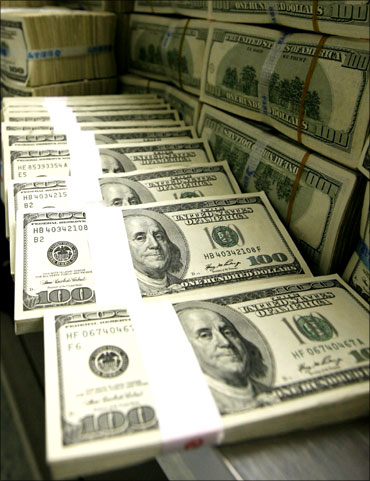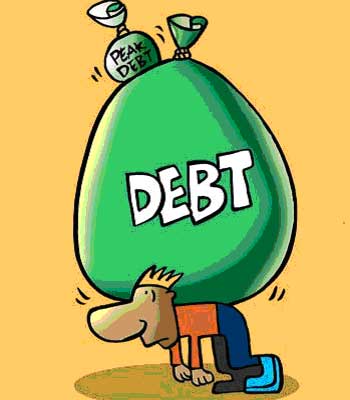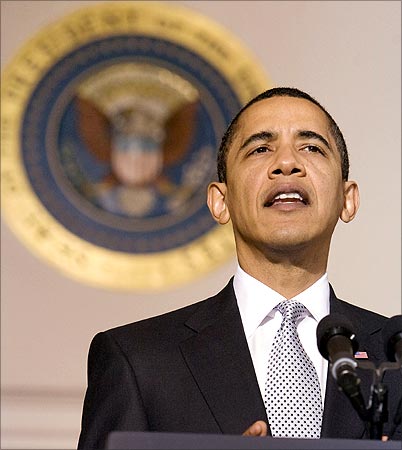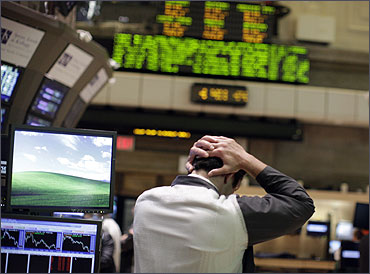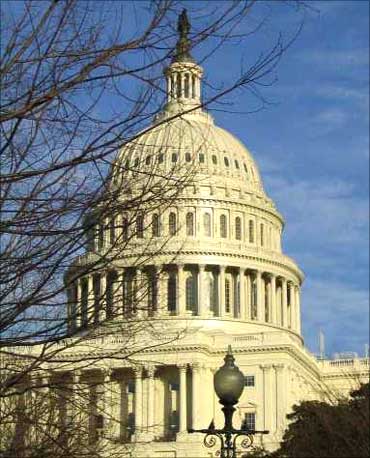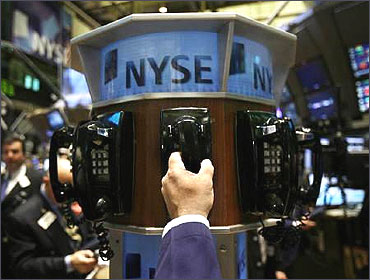 | « Back to article | Print this article |
CRASH! Why stock markets will continue to fall!
The Bombay Stock Exchange's Sensex, India's premier stock market index, opened 415.6 points or 2.4% lower from its last close on Friday.
As I write this the Sensex is down 530 odd points from its last close.
So what happened during the weekend that is giving the stock market such major hiccups?
On Friday evening Standards & Poor's, one of the premier rating agencies in the world, downgraded United States debt (basically financial securities issued by the US government to finance its fiscal deficit) to AA+ from its current AAA rating, a rating it first awarded the US way back in 1941.
Click NEXT to read on . . .
CRASH! Why stock markets will continue to fall!
So what does this mean in simple English?
The AAA rating is the best rating any financial security can get from Standards & Poor's.
It tells the investor that any financial security with an AAA rating is the safest security to invest in with chances of default being next to zero. AA+ rating is one level lower, and hence a tad riskier.
Click NEXT to read on . . .
CRASH! Why stock markets will continue to fall!
So what are these financial securities that we are talking about?
The United States government over the years has been spending more than what it earns. Like for the year 2011, the expected revenues for the US government stand at $2.17 trillion, whereas the expected expenditure is much higher at $3.82 trillion, leaving a difference of $1.65 trillion between what the government earns and spends.
This difference referred to as the fiscal deficit in technical terms is partly met through issuing financial securities which pay interest.
Click NEXT to read on . . .
CRASH! Why stock markets will continue to fall!
These financial securities are bought by investors (which include some of the biggest countries in the world) from all over the world.
Over the years by issuing such securities to finance its fiscal deficit, over the years, the US has accumulated a debt of over $14.3 trillion.
So what's the worry with the rating cut?
Some of the biggest investors in the world which include pension funds and mutual funds have a mandate to invest only in very, very safe financial securities.
Click NEXT to read on . . .
CRASH! Why stock markets will continue to fall!
Now instead of each investor deciding which are the safest financial securities to invest in, the broader market relies on ratings brought out by rating agencies.
Standard & Poor's is one of these rating agencies. Moody's and Fitch are the other big rating agencies. Standard & Poor's is the first 'major' rating agency to downgrade the rating of the financial securities issued by the US government.
With the downgrade there is a danger that investors who hold these financial securities may sell out. Of course, the level of selling will depend on the way the investors react to this downgrade.
Click NEXT to read on . . .
CRASH! Why stock markets will continue to fall!
Those who want to continue holding financial securities issued by the government can cite the ratings of the other two major rating agencies Moody's and Fitch, which are still to downgrade financial securities issued by the US government from their top level ratings.
So what will happen now?
Given that two rating agencies Moody's and Fitch still have not downgraded the financial securities issued by the US government, an immediate sell off in these financial securities is unlikely.
This is primarily because investors can always cite ratings issued by these rating agencies and continue holding on to the financial securities issued by the US government.
Click NEXT to read on . . .
CRASH! Why stock markets will continue to fall!
As the famous technical analyst Dan Norcini said in an interview after the downgrade, "I think the fact that the other two rating agencies, Moody's and Fitch, did not downgrade might take some of the heat off of the bond market. Had it been a downgrade by all three of these majors, the impact would likely be much more severe."
Other than this one must remember that some of the biggest countries in the world like China are the biggest holders of these securities. China holds around $1.1 trillion of these securities.
So it is in their interest that they continue holding on to these securities, simply because if they try and sell, the value of these securities will fall and thus hurt them in the process.
Click NEXT to read on . . .
CRASH! Why stock markets will continue to fall!
So when will investors start selling these securities?
The bigger trigger is likely to come when either one of the remaining two rating agencies Fitch and Moody's downgrade financial securities issued by the US government or US debt as it is generally called.
Another interesting point is a statement issued by China hours after the Standard and Poor's downgrade. It has asked the US to cure its addiction to debts" and "live within its means".
Whether that is a veiled threat or China plans to act on it, and sell US government financial securities, remains to be seen.
Click NEXT to read on . . .
CRASH! Why stock markets will continue to fall!
So what will happen if there is a sell-off?
This is a situation that the world does not want to see.
If investors who hold US government debt decide to sell off, the impact will be catastrophic.
Here is how things are likely to pan out. When investors decide to sell off financial securities issued by the US government, the value of those financial securities will fall.
When the value of the financial securities falls, the return on them for those who will buy it goes up.
Click NEXT to read on . . .
CRASH! Why stock markets will continue to fall!
Now this is against conventional logic, but let me explain. Let us say you buy a financial security from the government for Rs 100 which gives an interest of 5 per cent per year, and also promises to return the Rs 100 you had invested when the security matures.
Let us further assume that you manage to sell it for Rs 80 in the open market. The individual who buys from you also gets Rs 5 interest every year (5% of Rs 100), but he bought the financial security only for Rs 80.
So his rate of return is higher than yours because he has paid a lower amount for buying the security. The risk for him of course is that when he tries to sell it, he may not get Rs 80 that he paid for it. But if he decides to hold on to the security till the security matures he will get Rs 100 at the end.
Click NEXT to read on . . .
CRASH! Why stock markets will continue to fall!
So what will be the impact of this?
As explained above when the price of these financial securities falls, the rate of return that they offer is going to go up.
This in turn will push up interest rates in the overall economy. Why is that? Let us consider a financial security issued by the US government which has a remaining maturity period of 10 years.
Click NEXT to read on . . .
CRASH! Why stock markets will continue to fall!
Let us further assume that the return it is offering is around 6 per cent, after the price fall. This 6 per cent becomes a benchmark for everything else, primarily because the government is the safest borrower.
So when investing in securities issued by the government pays an investor 6 per cent, all other forms of investment should pay more. So the interest rate charged on all other loans, from auto loans to home loans to credit cards and much of everything else, should also go up.
The consumer credit outstanding in the US currently stands at around $2.43 trillion, or $22,000 per household. Higher interest rates mean higher EMIs (equated monthly instalments) and thus lower money to spend on other things.
This will slow down the American economy even further. It will also slow down other economies like China, which make a major portion of their money by exporting things to the US.
Click NEXT to read on . . .
CRASH! Why stock markets will continue to fall!
So what will be the impact on the stock markets?
A prospect of a further slowing down of the US economy, which is hardly growing any way, will lead to the various stock markets in the United States falling (when they open later in the day today).
The US stock markets falling will lead to the other markets in around the world falling.
International investors have a certain allocation across various markets. And when they lose money in one market or are likely to lose money in one market, they try and recover it from another market.
So when the US markets fall or are likely to fall (as they are expected to fall later in the day), the international investors try and recover some of their money from various stock markets around the world like the Indian market by selling stocks they hold here.
Click NEXT to read on . . .
CRASH! Why stock markets will continue to fall!
Obviously when the foreigners are selling, the domestic institutional investors also join the fray sometimes, when they see further losses on the horizon.
And this in turn leads to the stock markets in India falling as well.
This has led to the Sensex falling like it has today. Of course, the thing to wait for is when the other two rating agencies downgrade US debt, as and when they do, there will be carnage.
The author can be reached at shonalee.biswas@gmail.com

